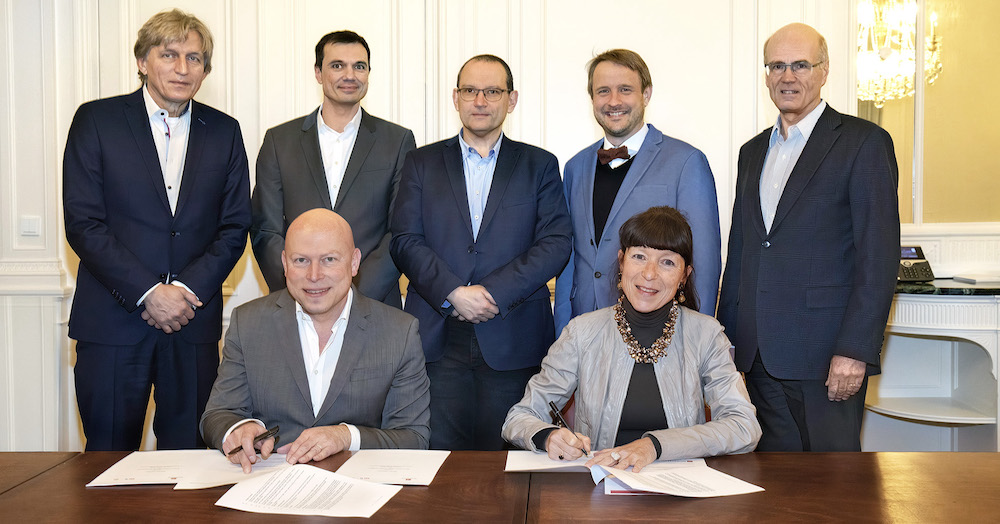FinTech

One day, your virtual avatar in the metaverse could not just attend concerts and go shopping, but also meet with your banker. Endless digital forms have become synonymous with today’s more complex banking processes, with constant signatures for Know Your Customer (KYC) regulations being only one example. But the metaverse offers the opportunity to transform the banking experience by delivering an immersive experience that integrates financial solutions.
Technological change like this will enable banks and their clients to build a trusted service relationship in a purely virtual environment. And this is crucial, as today’s customers are looking for both innovation and trust when they reach out for new financial products, like crypto-assets. Technology also plays a crucial role when it comes to reducing operational costs, especially in a realm of an increasingly complex regulatory environment. In this context, decentralised finance (DeFi)-based concepts enable new ways for banks to offer services to their customers, while also making their back-office operations more efficient.
That’s why, in 2022, Spuerkeess and the University of Luxembourg’s Interdisciplinary Centre for Security, Reliability and Trust (SnT) announced a new partnership focused on exploring the potential of decentralised finance (DeFi). The announcement introduced four projects focused on exploring the potential of decentralised finance (DeFi) and the metaverse. The new partnership represents a deep dive into innovative financial technology (FinTech), and the scale of the research involved is set to have a clear impact on the everyday banking experience of Spuerkeess customers.

“Crypto-assets, virtual currencies that allow for digital payments to be made outside of the traditional structures like banks, are based on a technology that SnT has been investigating over years. This technology also can be used to disrupt traditional bank workflows and make them more efficient. This is the purpose behind this new direction in our long-term partnership with Spuerkeess,” said Prof. Radu State, head of the Services and Data Management (SEDAN) research group, which is leading two projects in the collaboration.
The announcement covers four projects all looking into how DeFi, and the distributed ledger technology (DLT) on which it is based, can be integrated into Spuerkeess’ business. Key topics include the metaverse, crypto-assets, non-fungible tokens (NFTs) and the mutualisation of back-office operations based on DLT. The new partnership has been initiated by SnT’s Finnovation Hub, launched in 2022 to assist the financial sector in further embracing cutting-edge technology – with a view to improve efficiency of processes, reforming business models and advancing digital services, to shape the financial industry of tomorrow. The research is being executed by teams in two SnT research groups to deliver a comprehensive outlook on how DeFi can be integrated into traditional banking.
”This technology also can be used to disrupt traditional bank workflows and make them more efficient. This is the purpose behind this new direction in our long-term partnership with Spuerkeess.”
Prof. Radu State, SnT Tweet

“This collaboration is a key part of our digital innovation strategy and gives us the chance to collaborate and benefit from the expertise of SnT on the subject of DLT,” added Christophe Medinger, deputy head of business unit digitalisation at Spuerkeess.
One of the projects aims to make crypto-assets and decentralised finance more accessible to the public. While many people might be interested in investing in crypto-assets, they are hesitant because of the inherent risk associated with them. By offering clients evidence-based information on financial performance, within a practical and easy-to-use platform, or even the metaverse, the inherent risk of crypto-assets could be mitigated for everyday banking customers.
The metaverse is also the dedicated topic of another project, looking to harness the ability to create seamless interactions between co-workers, clients and account managers in the digital world. In fact, the metaverse offers the bank the possibility to conduct virtual onboarding for new clients and manage relationships in this digital space. By recreating the current client experience in a virtual environment, clients stand to benefit from an immersive remote experience.
“Today, everyday financial consumers, businesses, and of course traditional financial service providers are interested in benefitting from DeFi. This collaboration represents an exciting new opportunity to conduct research that is relevant for today’s financial services industry,” said Prof. Gilbert Fridgen, head of the Digital Financial Services and Cross-Organisational Digital Transformation (FINATRAX) research group, which is leading another two projects in the collaboration.
“Spuerkeess is investing in, and contributing to, practical research on a technology that is redefining the world of finance by studying and experimenting with practical use cases for our bank and the financial centre."
Françoise Thoma, Spuerkeess Tweet
The other two projects in the collaboration consider how DeFi can tackle current challenges with the way that financial institutions cooperate with each other and submit data for market calculations. Today, when banks need to work on something together, such as a syndicated loan (where debt is spread across multiple financial institutions), the process to do so is extremely complex. By digitalising this process, the associated costs are projected to decrease, which would create the possibility to use these loans for more than the multi-million objects, like planes, that they are used to finance today.
In a similar way, DeFi can be used to tackle the current challenges associated with verifying the Euro Interbank Offered Rate (EURIBOR). The EURIBOR is a key metric used to track the average interest rates European banks are using to borrow funds from each other. By decentralising the computation of EURIBOR and making individual contributions cryptographically verifiable, the EURIBOR could become a more reliable metric.
“Spuerkeess is investing in, and contributing to, practical research on a technology that is redefining the world of finance by studying and experimenting with practical use cases for our bank and the financial centre,” concluded Françoise Thoma, Chief Executive Officer of Spuerkeess.